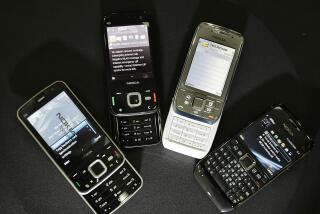Downtime in the Digital Age
- Share via
What are you doing on your summer vacation? Relaxing at the beach? Enjoying friends and family?
Or are you checking your smartphone every five minutes?
It’s the essential predicament of the Digital Age. Even on vacation.
It’s tempting to blame our tools, the BlackBerrys and the iPhones that keep us so connected and busy. But the real problem isn’t the technologies; it’s us. We’ve convinced ourselves that the more connected we are, the better. We never give ourselves a break.
But we’re human beings, not machines. To think clearly, work well and truly enjoy our lives, we need regular respites from our connected lives.
This is not a new challenge. For thousands of years, people have been inventing new communications devices that enrich people’s lives while at the same time increasing the amount of information they have to navigate. The result has always been a combination of excitement and overload.
What Google is to the 21st century, the printing press was to the 16th. Shakespeare was so familiar with the overload problem, he gave us a tragic hero, Hamlet, who refers to his own head as a “distracted globe” cluttered with useless information.
Back in the 19th century, there were complaints about telegraph traffic pulling parents away from the family dinner table. Even snail mail was once addictive. Noticing how often his friends and neighbors checked their mail, Henry David Thoreau wrote: “As our inward life fails, we go more constantly and desperately to the post office. You may depend on it, that the poor fellow who walks away with the greatest number of letters proud of his extensive correspondence has not heard from himself this long while. “
Sound familiar?
Some want to run away from the latest gadgets. But if history teaches anything, it’s that the techno-pessimists are generally wrong.
Besides, all we really need is a new way of thinking about our devices, one that will bring our lives back into balance. We could start by taking this advice:
“Turn off your computer. You’re actually going to have to turn off your phone and discover all that is human around us.”
These are not the words of some Luddite malcontent trying to hold back progress. They were spoken by Eric Schmidt, the chairman and CEO of Google, in a commencement address he gave at the University of Pennsylvania last year.
On one level, it’s surprising that the leader of the company that defines the Digital Age should be encouraging us to disconnect. But in another way, it’s simple common sense. The point of technology is to free us from drudgery, to give us more time to enjoy the things that really matter, not less.
There’s no better time to remind ourselves of this than summer, the season of respite.
As Schmidt suggests, it’s not all that hard to do. The choice is yours: Disconnect regularly, even if it’s just for an hour a day. Or keep feeding your screen habit until you can barely remember the meaning of the word “downtime.”
Is there an app for sandcastles? I’m sure someone’s working on one. Here’s a better idea: Turn off the iPad, get down in the sand and start building.
William Powers is the author of “Hamlet’s BlackBerry: A Practical Philosophy for Building a Good Life in the Digital Age.”






